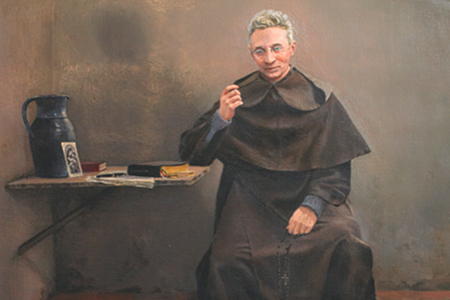Many of us experience God as hidden. There is nothing new in this. It is not something unique to our time. Already, two and a half thousand years ago, Isaiah sighed in exile: “Truly, You are a hidden God”. (Is 45:15). Throughout the centuries, people of faith have repeated such words to the Lord, up to and including Titus Brandsma. For Titus, the hiddenness of God was a deeply lived reality.
In his prison cell at Scheveningen, Titus prayed the well-known hymn Adoro Te after lunch. In his account of his time in prison, ‘My Cell’, he tells us about this: “The Adoro Te has become my favourite prayer. Frequently I sing it softly and this helps me to make a spiritual communion”.
Titus knew this song by heart. He prayed it daily and every Saturday evening he sang it with his fellow brothers during the Saturday Station of Our Lady. The hymn touched Titus deeply. He was familiar with it. He carried it with him into prison. There Titus sang it ‘softly’, on his knees, after his lunch of soup and bread. Prayerfully it dawned on him: really, God is hidden. Not now and then. Not here and there. Always and everywhere, God is hidden.
After this moment of worship, Titus lit a pipe, walked to and fro in his small cell, and filed his nails, which by now had become “too long and I could not find the scissors.” God, for Titus, is hidden in the most ordinary things: a pipe of tobacco, walking to and fro, filing his nails.
God’s hidden presence is hopeful for those who have come to know it and to live from it. Seeing his hiddenness can even become so familiar to us that it makes us happy. Our God does not come like a jack-in-the-box. He is not an Easter egg hidden somewhere or a magic trick.
In the Dachau concentration camp, Titus’ hidden relationship with God is severely tested. Adoro Te drags him through it. When the camp guard has beaten him, he prays the Adoro Te together with his fellow brother, Rafaël Tijhuis. Hurt in his frail body, he remained standing in God’s hidden presence.

